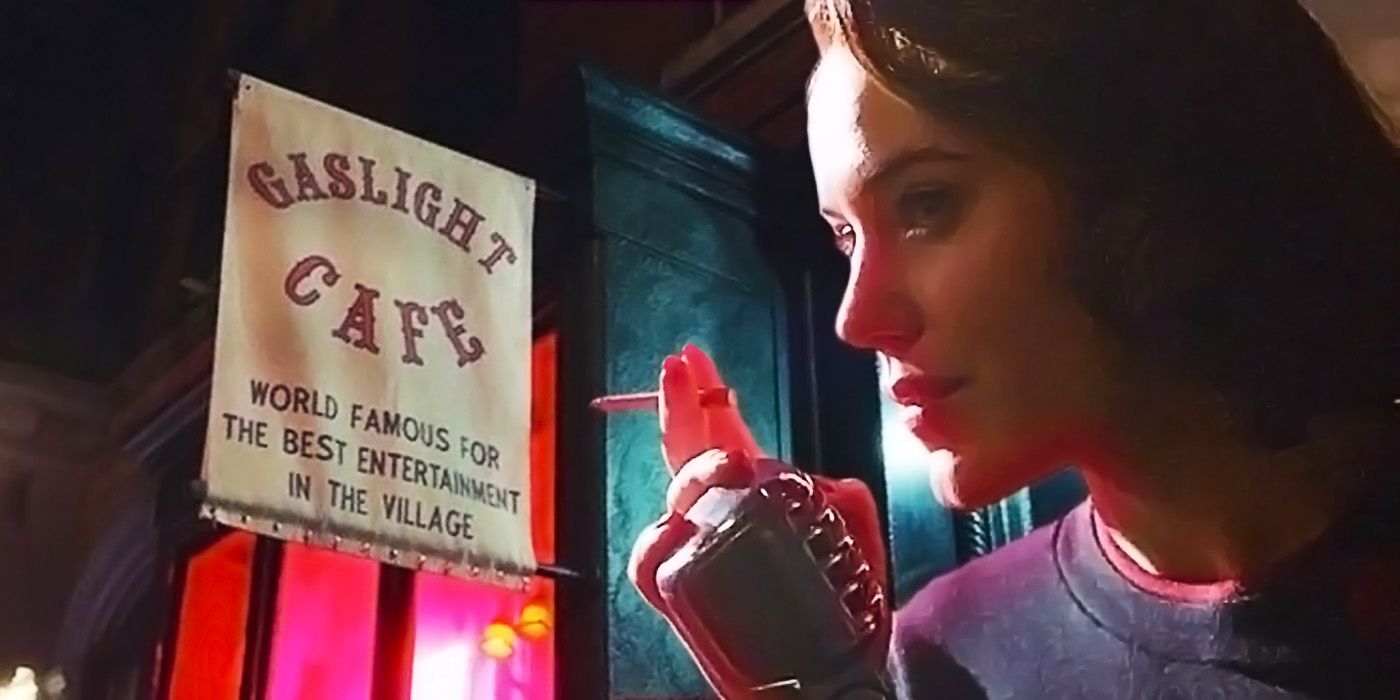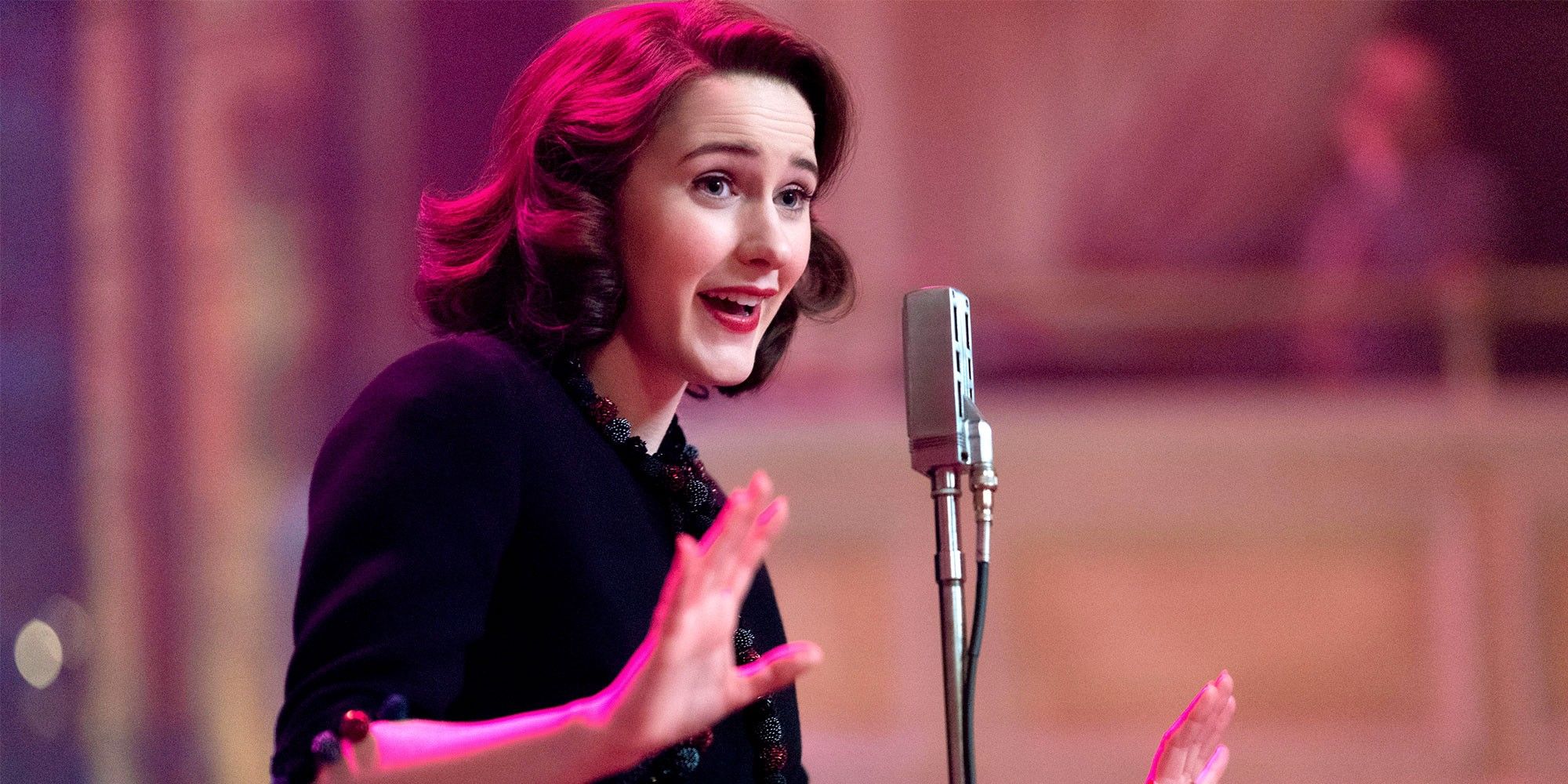The Gaslight Café is where Midge Maisel debuts her comedy act during the series premiere of The Marvelous Mrs. Maisel. Midge (Rachel Brosnahan) returns to The Gaslight to hone her skills at various points in her career. The Gaslight was in fact a real hangout in Lower Manhattan, New York City. This familiar setting was frequented by poets, musicians, comedians, and celebrated members of the Beat Generation until its closure in 1971.
Marvelous Mrs. Maisel’s first season is set in 1958, which was also the Gaslight’s first year in business. Midge’s world as a dutiful housewife, mother, and unofficial manager for her would-be comedian husband, Joel (Michael Zegen) implodes after Joel announces he’s leaving Midge for his naive secretary. Midge drunkenly kicks off her standup career onstage at The Gaslight, riffing on her husband’s indiscretions with wit and rage all her own. Mrs. Maisel’s timeline as a comic plays out as she tackles unceremonious dive bar gigs, a capricious telethon appearance, a tour with international crooner Shy Baldwin (Leroy McClain), and the fallout from losing her spot in Shy Baldwin’s world tour. Midge eventually takes control of her act as the emcee at a strip club.
The shallow, dank basement where The Gaslight was situated started as literary speakeasy in the 1920s and '30s. It transformed into one of several famous folk clubs in Greenwich Village. The Gaslight represented a cultural revolution in the late 1950s that mirrors the transition of Midge’s own evolution from housewife and mother to a career comedian with a rap sheet (Mrs. Maisel is arrested several times in seasons 1 and 4).
The series honors The Gaslight by maintaining historical elements from its alcohol-free menu to performer compensation. Real-life Gaslight owner John Mitchell adhered to a dry atmosphere because it meant he could keep his establishment open into the early morning hours. Midge clarifies for her mom in season 4, episode 5 “How to Chew Quietly and Influence People,” that The Gaslight is a “basket house” and she can’t pay bills if she doesn’t take other gigs. Though The Gaslight sometimes charged cover fees to share with its performers, Midge performed at the café when entertainers would pass baskets or hats around the audience for tips. The scant pay urged her to seek shows elsewhere. While lengthier evenings created more opportunities for The Gaslight’s performers, the fiscal reality matched with Midge’s career aspirations propel her and Mrs. Maisel manager, Susie Myerson (Alex Borstein) to explore paying gigs outside of their original stomping grounds.
The purview of a woman’s world in the 1950s expanded at the decade’s end. Women’s rights progressed alongside the booming voices of the Beat Generation. The Gaslight was one of several cafes on MacDougal Street in Greenwich Village where beat poets like Diane di Prima, Allen Ginsberg, and Jack Kerouac read their nontraditional works addressing sex, politics, drugs, and spirituality to audiences. The café would later add folk music to its lineup, a trend wryly addressed by Suzie in season 4, episode 3 “Everything is Bellmore.” In Marvelous Mrs. Maisel season 3, Midge comes into her own as single woman and a performer who doesn’t hesitate to hold true to her values, like when she refuses to perform during a live radio broadcast endorsing the paleoconservative politician, Phyllis Schlafly in season 3, episode 7 “Marvelous Radio.”
The burgeoning artistic tide at The Gaslight coincides with the evolution of Mrs. Maisel herself. Bob Dylan, Jimi Hendrix, Joni Mitchell, Bonnie Raitt, and countless other acts developed their signature sounds at the café where entertainers like Woody Allen were also booked to break up the flow of poetry and music. Marvelous Mrs. Maisel creator Amy Sherman-Palladino has said Midge was inspired by Joan Rivers, another Greenwich Village comedian who fearlessly cut her teeth at The Gaslight as a strongminded female. Midge is venturing into her own renaissance at a time when the Beat Generation is giving way to new interpretations of thought, furnishing a permanent cultural shift delivered firsthand by The Marvelous Mrs. Maisel.


